By Lucy Komisar
It‘s 1981 in Northern Ireland. The body of an IRA militant who disappeared ten years before has been found, preserved in a bog. An IRA chief, Muldoon (the threatening Stuart Graham) is worried how Quinn Carney (Paddy Considine), the man‘s brother, will react, because he is a former IRA activist and knows or suspects how the victim died.
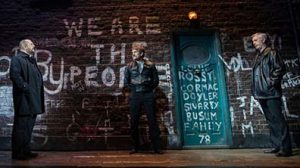
Muldoon summons a priest, Father Horrigan (Charles Dale), to get him to visit Carney who is living with his family on a farm near the southern border, to feel out his reaction. When Horrigan demurs, Muldoon threatens his sister. Horrigan will acquiesce, so, morality already takes a hit.
But in Jez Butterworth‘s gorgeous play, directed by Sam Mendes with subtle power and intelligence, that dark moment suddenly is transformed into a charming rough idyll of Irish family life. Irish because it involves a brood of seven children, a lot of whiskey drinking, wit and occasional dancing of jigs.
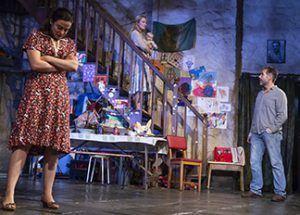
That section is perhaps a too long in a play that runs over three hours. But it takes time to establish confusion. Are Quinn and Caitlin Carney (Laura Donnelly), dancing and playing around at night, husband and wife? Later, a young woman comes down stairs with a baby. Is she the mother? Another woman will descend, and we learn she, Mary (Genevieve O‘Reilly) is the mother of seven and the wife of Quinn. Why is she always in a nightdress?
The bits of the story come together. Caitlin is the widow who has lived in the house since Seamus Carney‘s death. Though there are repeated rumors of his sightings, she is quite sure he died, since his car was found under a tree, where the fastidious auto enthusiast would never have left it.
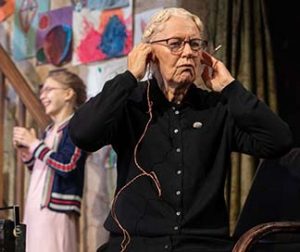
Politics enters through the all-seeing militant Aunt Pat (the terrific Dearbhla Molloy), whose brother took part in the 1916 uprising and was killed. She is bitter about Prime Minister Margaret Thatcher, listens on the radio as she refuses to accept hunger strikers as political prisoners. She calls her “a sanctimonious stone-hearted sow.” It will end with the death of Bobby Sands.
Pat‘s younger sister Aunt Maggie (Fionnula Flanagan) is mostly spaced out and in a wheelchair. Occasionally she dredges up the past, this time, 1802, about a great Faerie battle, a mythic conflict. As the current conflict has become mythic.
With some irony, Pat remarks, “Can you imagine walking in here and misreading the situation?” Indeed! (I admit, Pat is my favorite character.) Butterworth is quite skillful at creating that artful mood, when you are not quite sure of what you are seeing.
The Brits indeed were brutal. The neighbor Shane Corcoran (Tom Glynn-Carney), who wears his IRA sympathies in an emblematic black leather jacket, tells how, “Me and Diarmaid in the Shanty, we‘re in the alley there, the Paras‘ve got the 9mm Browning in my ear. “I‘m gonna scone you, you Irish fuck. Knock your fuckin‘ cunt in.”
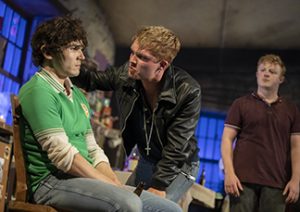
They kicked us in the bollocks so hard Finn had an epileptic fit. His Ma went to the Police Station. Waited seven hours. They made her fill out a form. Then they whip out the lighter there and burn the fucking form and drop it in her lap.”
But so were the IRA brutal. Michael Carney says, “I don‘t want watch the door while a Catholic boy gets hammered.” That is about a suspected informer Shane witnessed beaten. “I don‘t want to wear that boy‘s cross round my neck, show it off to people like a prize. Thinking I‘m Spartacus when I‘m just a fucking gangster.
I don‘t want to get shot in the back of the head for something I probably never did, and spend ten years face down in a bog in the middle of nowhere while my wife and child sit waiting, hoping, praying for me to come home. If that‘s the road to justice you can fucking bangle it.”
So, this was a story with many villains and so far few heroes. The strands weave a web. An essential one, aside from the brutality, is how the IRA-British conflict destroyed families, with sons and neighbors on conflicting sides.
There‘s also personal heartbreak. Mary senses something between Caitlin and Quinn and has retreated for years to her bedroom.
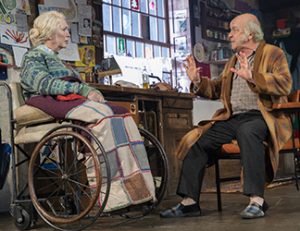
Uncle Pat (the ineffable Mark Lambert) seeks to defuse tension, with poetry. The most telling is his line about the Ferryman, who takes dead souls to the beyond. He says, “Our friend Virgil has it that there‘s only two types of souls forbidden passage to the beyond. The unburied. And liars. Those that lie to the innocent.”
The challenge is to Quinn who persuaded his brother to join the IRA and is quite convinced he was killed by his comrades. Will he take Muldoon‘s deal to hold his tongue in exchange for providing Caitlin with a house in another town and keeping quiet about their relationship? Though there is no indication it was anything but of the spirit.
Focusing on key plot lines deprives the reader of the rich tapestry of Irish life that Butterworth presents. The acting is superb. The kids are charmers. The difficulty is walking out of the theater and not being able to choose who are the heroes and villains. Yes, the Brits were villains. But the IRA fighters were sometimes not much better. For a British playwright to deal with this still smoldering conflict so without prejudice is quite extraordinary.
This play is a rich, memorable and stunning event.
“The Ferryman.” Written by Jez Butterworth, directed by Sam Mendes. Bernard B. Jacobs Theatre, 242 W 45th Street, New York City. 212-239-6200 or 800-447-7400. Opened Oct 21, 2018. 10/28/18.


What can I say about The Ferryman? Well, the only good thing is the acting (apologies to greats Fionnula Flanagan and Paddy Considine in advance) otherwise, total shite! Insulting shite! The play is an endless parade of Irish cliches: the randomly dancing of jigs in the kitchen; the drinking of whiskey for breakfast -make that, literally, morning, noon, and night (I have never seen people drink like that and I grew up in an Irish family from that exact part of Ireland); the litter of children scampering about (you know those ignorant Catholics); the played-out painting of the IRA in the worst possible light (terrorists, yet again…I guess the founding fathers and American revolutionaries were terrorists, too!); all adds up to an inexorably unlikable play if you have the least bit of knowledge about Ireland, Irish history, and or Irish culture. I am embarrassed for the Irish-Americans who think this is great theater. It is NOT a “new Irish classic”; it is an infuriating imitation of many things that amounts to nothing authentically Irish at all. It is written by a Brit and directed by a Brit, and it is a complete and utter insult to those who fought and died for Irish independence.
Let us be clear, there is NO modern Ireland without the IRA and Sinn Fein, so this play is selling a lie. It attempts to vividly and theatrically pull the wool over the eyes and minds of its audience. Sorry, this Irish boy knows much better because he knows the true history of his mother’s land and culture. The wool is hardly worth the pulling. You don‘t get to enjoy your tours of Dublin, Cork and Galway without understanding HOW exactly the Republic of Ireland came into being and the tremendous blood spilled and sacrifices made for that to happen. The IRA or the RA (OE -Oglaigh na hEireann- as we call it in Irish) helped create and build the modern Ireland, so you do not get to dismissively reduce them to thugs and terrorists, while claiming to be (as this British playwright has apparently stated) “in love with Irelandâ€.
I get that The Ferryman is entertaining and filled with great acting…objectively the direction is excellent… but, ultimately, it is a play about the Irish experience in the North (something to which I have a close personal connection) written by a Brit. The idea of that in the 21st century is laughable if it were not so dangerous. I ask you now to go see a play about the Black Experience in America written by a white man, or a play about the Armenian genocide written by a Turk, or a #MeTooMovement themed play written by a 60-year-old straight white guy, or a play that claims to tell the Jewish experience in WWII written by a German gentile, and then tell me it is so marvelous. (I’ll wait) …. And, please do not argue that -of course- a straight person can write a gay character and a black person can write a white character, and a Christian can write a Jewish character… these are not accurate analogies as this is an entirely Irish play (24 Irish characters?) about Irish history written by a Brit who admittedly knows nothing about the subject but what his Irish girlfriend told him! Sorry, but…no. Just, no!
Yes, it is a solid production with wonderful, eye-catching stagecraft and performances, if you accept the wholesale pilfering of Lenny from Steinbeck’s “Of Mice and Men” reinvented as the ONLY Brit in the play who is a sweet, big lug of a guy who -get this- “accidentally kills” a young Irish boy! For those of us who had relatives shot, beaten and killed by the official and unofficial British police forces (RUC, Black & Tans, UVF whatever you call them) this is a riotous joke. A play set in the north of Ireland where the Irish are murdering each other and the ONLY murder of an Irish person by a Brit turns out to be A FUCKING ACCIDENT??? (insert Stanley Kowalski’s venomous, mocking “Ha! Ha! Ha!” from Streetcar here.)
Many Americans have long been wary of (if not blatantly hostile towards) the IRA because of their support for the PLO, often summarily dismissing the IRA and Irish Republicans as anti-semites and anti-Americans; this must be what is driving the London and New York critics heaping this theatrical atrocity with fawning praise and over-the-top quotable quotes and 5 star reviews. To the Jewish audience members I would like to make this analogy, the great Elie Wiesel in his seminal Holocaust memoir Night wrote about the terrifying daily life in Auschwitz; and among the stories told therein are snippets of some of the inmates poorly treating and occasionally even betraying each other. The Ferryman is the equivalent of a non-Jew exploiting this fact and writing a play about how horrible the Jews were to each other in the camps, perhaps even having the cast do a “Fiddler on the Roofâ€-type dance in the middle of it, and missing the fact that they were PUT THERE and SYSTEMATICALLY BEATEN, OPPRESSED, HUMILIATED, AND MURDERED WHILE THERE BY THE NAZI GERMANS! Let that sink in.
It is usually a bad sign if at the end of the play you feel the need to have three homicides in thirty seconds. Let me be frank, the play is absolutely insulting to Irish people; and poor Bobby Sands and the rest of the H-Block hunger strikers – I assure you- are rolling in their graves at the invocation of their names. The NY Times and many other reviews are not seeing this the way they need to. The best analog for Americans, and it is certainly why my passion resonates with African Americans, is that this play is the equivalent of a play claiming to be an African-American classic when it is written by a southern white person. After centuries of white people writing black history we rightfully no longer accept that. To Kill A Mockingbird is still a great piece of literature but we do not dare market it as “the real black experience in America.” The Ferryman is a great spectacle of a show, but, please, do not get it twisted, it is NOT Irish, it is certainly not authentic, and it is by no means a modern classic. It is gimmicky and riddled with creaky cliches, and downright insulting to actual Irish people whose tortured history it claims to tell. I ask whoever reads this to consider these points -before having a typical lemming-like response to Ben Brantley‘s glowing review- and going to see it on Broadway. And if it is AFTER you have seen it, I ask you to reconsider your gushing and praising of a play many of us find insulting and politically/socially dangerous.
No one in Ireland will ever produce it. They would probably burn the theater down if they tried.
-Frankie McCreely, playwright